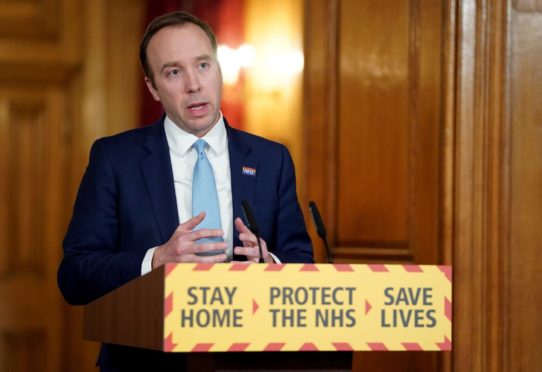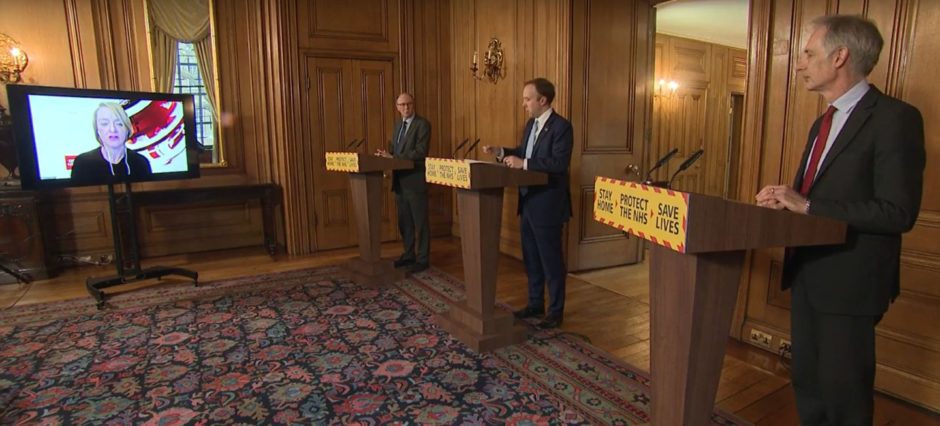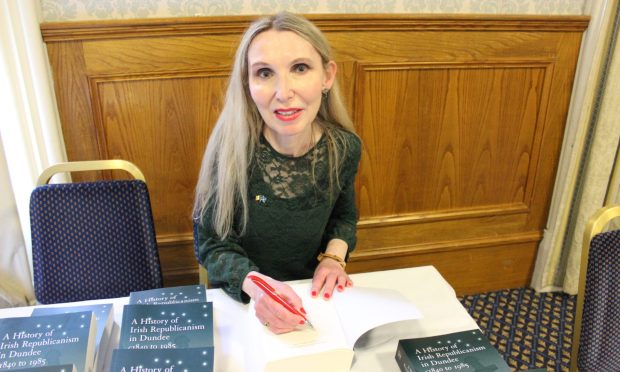Britain is “in the midst of a war against an invisible enemy”, Health Secretary Matt Hancock said as he announced a radical plan to scale up coronavirus testing capability.
Mr Hancock, appearing at the daily Downing Street press conference, explained that mass testing was the way to “unlock the coronavirus puzzle and defeat it” as he revealed a five-point plan to increase tests to 100,000 a day in England by the end of April.
Scotland could end up benefiting from the policy after all four nations of the UK entered into a joint agreement to share the vital life-saving kit.
It comes as 2,921 people were confirmed to have died in hospital after testing positive for coronavirus in the UK.
The youngest person who died without underlying health conditions was aged 25.
The total is up by 569 from 2,352 the day before and is the biggest day-on-day increase so far, just above the 563 reported the day before.
Mr Hancock, who is out of self-isolation after recovering from Covid-19, said he has returned to work “more determined than ever to fight this disease”.
He said: “We are in the midst of a war against an invisible enemy, and it is a war in which all of humanity is on the same side.
“We will strain every sinew to defeat it once and for all. I will stop at nothing to make sure that frontline staff have the right equipment so that they are safe and can have the confidence they need to do their jobs.”
He added: “I’m now setting the goal of 100,000 tests per day by the end of this month. That is the goal and I’m determined we’ll get there.”
The announcement comes after criticism over the amount of testing for Covid-19 the UK has undertaken in comparison with other counties.
A total of 163,194 people in the UK have been tested, which is the equivalent of around 245 people in every 100,000 or roughly 0.2% of the population.
The rate of testing in the UK is lower than a number of other European countries where data is available.
For example Germany is capable of conducting up to 500,000 tests a week, according to virologist Dr Christian Drosten, whose team developed the first test for the new virus at Berlin’s Charite hospital.
Mr Hancock, addressing this issue, said: “Unlike some countries, we didn’t go into this crisis with a huge diagnostics industry.
“We have the best scientific labs in the world, but we did not have the scale. My German counterpart, for instance, could call upon 100 test labs ready and waiting when the crisis struck. We have had to build from a lower base.”
Mr Hancock also said there had been problems with some tests being inaccurate.
“In one case a test that I’m being urged to buy missed three out of four positive cases for coronavirus,” he explained.
“That means that three-quarters of cases, that test would have given the false comfort of sending someone with coronavirus back on the wards. Approving tests that don’t work is dangerous and I will not do it.”
“We have the best scientific labs in the world, but we did not have the scale. My German counterpart, for instance, could call upon 100 test labs ready and waiting when the crisis struck. We have had to build from a lower base.”
Mr Hancock said his plan would include moving to provide 25,000 swab tests per day for frontline staff, teaming up with private companies to establish more swab testing, new antibody blood tests to see who has already had Covid-19, surveillance to measure the rate and spread of infection and building up the UK’s diagnostics industry “at-scale”.
The plan comes after the UK Government also announced it was scaling up its public health messaging with a series of striking adverts warning the public “people will die” if they don’t stay home during the lockdown.
Full-page adverts featuring the new messaging – including the slogan “Stay home. Protect the NHS. Save lives” – have been placed in most national newspapers, while social media users have also been targeted with the advertising across a variety of platforms.
The new campaign takes a far stronger tone than any produced by the Government before, using striking red and yellow colouring and featuring dramatic images of NHS staff in face masks and other protective wear.
In one example, promoted on Facebook, users are told: “If you go out, you can spread it. People will die.”
Another warns: “Anyone can get it. Anyone can spread it.”









